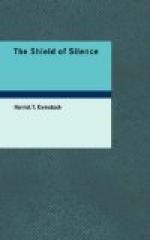After that the other Sisters could not feel happy and content in the atmosphere of antagonism that Sister Angela had partially overcome, but with which they had no sympathy. They returned to the Middle West and entered a Sisterhood where their duties and environment were more congenial. Ridge House reverted to the Fletcher estate and Uncle Jed was put in charge.
“I may use it later,” Doris explained, “or I may turn it over to Father Noble if he ever needs it.”
What this all meant to Mary no one ever knew—she saw, now, no return to her hills, and her longing for them grew as the years passed, and her curiosity flattened in the dull round of duties and commonplace routine. Only one emotion largely controlled her thought and that was a dumb gratitude for what she believed she was receiving. She could not agree that her devoted service gave ample return. She was under obligation, and the feeling was blighting to the girl’s independence. Work, the necessity for work, was an accepted state of mind to poor Mary. The luxury and consideration that were hers in her present life took from labour, as far as she mentally considered it, all the essential qualities that gave her independence. She was accepting—so she reflected in that proud detached logic of the hills—from outsiders what no mere bodily labour could repay, certainly not such service as she was giving. Just loving and caring for two little children!
With cautious and suspicious watchfulness through the years Mary regarded Doris Fletcher still as “foreign.” Foreign to all that was born and bred in the girl’s inheritance of mountain aristocracy, but she had been touched by the justice, the unerring kindness of the woman, who, to Mary’s wrong ideals, gave and gave and constantly made it impossible for her to make return.
“Some day,” the girl vowed, when her manner was most grim and repelling, “some day I’ll do something to pay back!” And then she grew bewildered in the maze of wondering if the “quality” so precious to her understanding might not exist in all places? Might it not be?—but here Mary became lost.
When she recalled, as less and less she did, the unlawful spying of hers on the west chamber of Ridge House, she set her lips in a firm line. She had gone far enough on her upward way to detest the cringing, deceitful methods of her childhood and she sternly sought to right herself, with her burdening conscience, by putting away forever what possible significance lay in the strange coming of that first and second child to Ridge House.
“Were they twins? Were—they?” But Mary always was frightened when she got into her mental depths.
Three or four vital and significant events marked the years intervening between Doris’s return to New York and the day when Joan and Nancy entered womanhood.
The first incident seemed slight in itself but proved the truth of the need for caution when one is on a blind trail. With all her good intentions and high hopes Doris was bewildered as to her steps. She who had been the soul of frankness and cheerful friendliness was now reticent and reserved.




